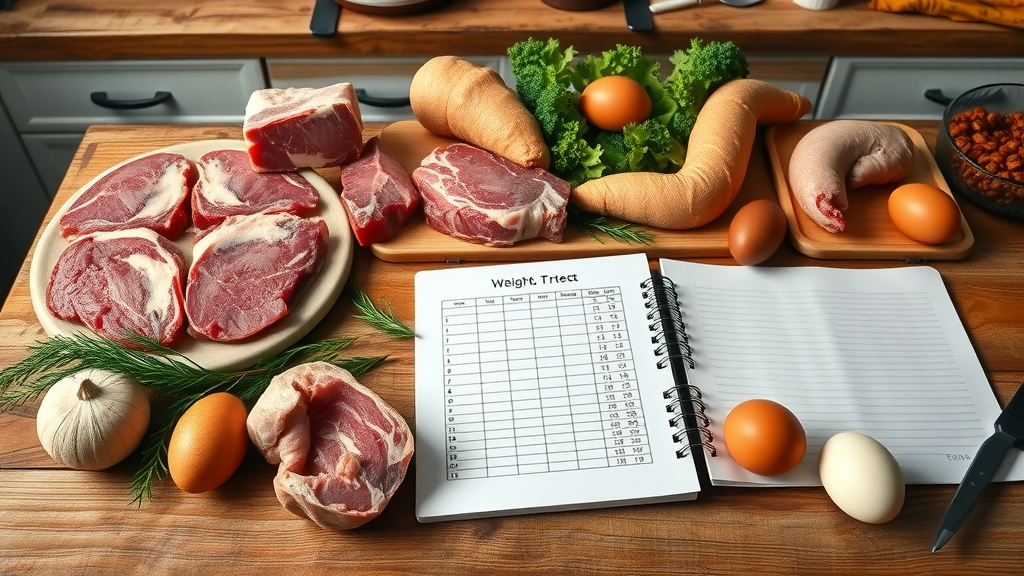Did you know that over 60% of new carnivore diet adopters cite plateaued weight loss as their key concern after the first month? If you’ve found yourself frustrated with stalled results, you’re not alone—and you're about to discover the insider fixes that can finally ignite progress. The carnivore diet promises rapid results, but the path isn’t as linear as it seems. Let’s cut through the myths and get real about what works, what hinders your progress, and how to break through that stubborn plateau.
"Did you know over 60% of new carnivore diet adopters cite plateaued weight loss as their key concern after the first month?"

Opening Insights: Carnivore Diet Weight Loss by the Numbers
When starting a carnivore diet weight loss journey, expectations run high—especially in the first few weeks, when pounds seem to fall off with almost shocking speed. Early adopters often report losing five, ten, or even fifteen pounds in their inaugural month. However, as the weight loss curve flattens, reality sets in: progress slows, motivation wanes, and doubts arise. This scenario is far more common than you might think. The initial loss is typically attributed to a sharp reduction in carbohydrate intake, leading to depleted glycogen stores and significant water loss. Fat loss, on the other hand, relies on a diverse range of individual factors, from metabolic health to muscle mass and hormonal balance.
Adding to the challenge, anecdotal evidence and self-tracked data sets from hundreds of carnivore communities show that the famed “rapid results” begin to taper off, sometimes as early as week three or four. This pattern underscores a fundamental truth: mastering carnivore diet weight loss goes far beyond swapping plant foods for animal products. Understanding the numbers behind why the weight loss tapers—and what truly causes these bottlenecks—can empower you to intervene appropriately, tailor your diet plan, and see substantial results.
What You’ll Learn About Carnivore Diet Weight Loss
- Hidden factors behind stalled carnivore diet weight loss
- How diet plan tweaks can reignite progress
- Debunking common weight loss myths in the carnivore community
- Real fixes based on insider evidence
Understanding Carnivore Diet Weight Loss: Insider Information

How Does the Carnivore Diet Compare to Other Diet Plans for Weight Loss?
- Key differences with keto diet, low-carb diet, and standard carb diet
- Why the carnivore diet’s drastic approach can help—or hinder—weight loss
The carnivore diet is an extreme diet compared to typical eating patterns. Where the ketogenic diet emphasizes very low carbs but allows certain plant foods (like nuts or avocados), the carnivore eliminates them entirely, focusing exclusively on animal products (red meat, eggs, and fish). Compared to a classic carb diet or a balanced diet with multiple food groups, the carnivore diet forces the body into a state of extreme carbohydrate restriction. This sometimes leads to rapid weight loss, partly due to depleted glycogen and associated water weight. However, this comes at a high level of metabolic flexibility demand, requiring optimal gut health and precise adaptation.
Differences with the keto diet or low-carb diets extend to satiety cues and micronutrient diversity. While many experience initial improved energy and focus on both ketogenic and carnivore diets, the absence of plant foods can impact long-term sustainability, digestive health, and micronutrient balance. It's important to recognize that just because a diet plan is low in carbs, doesn't guarantee uninterrupted or consistent weight loss. Each eating approach presents unique challenges and potential pitfalls, especially regarding hormonal balance and adaptation.
Weight Loss on a Carnivore Diet: Initial Results Versus Long-Term Struggles
- What research and anecdotes reveal about weight loss patterns
- Are fast results sustainable?
Nearly all carnivore diet success stories tout lightning-fast weight loss in the opening weeks. For many, this is a much-needed motivation boost. However, scientific reviews and a multitude of user anecdotes indicate that weight loss rapidly slows after the initial period, resulting in what is commonly known as a “stall” or plateau. This can be discouraging, but understanding the physiology helps: as water weight drops and your body adapts to the absence of carbohydrates, fat loss becomes predominantly dependent on true calorie deficit and metabolic response.
Many users transitioning from high-carb or standard American diets to carnivore experience both improved blood sugar levels and reduced inflammation initially. But, sustaining these benefits and translating them into continued fat loss often requires more than simply eliminating plant foods or sugars. Lasting results frequently depend on intentionally cycling macronutrients, monitoring caloric intake (even with “free-eating” protocols), and troubleshooting hormonal adaptations that can inhibit progress. Without these strategic shifts, long-term weight loss becomes a significant challenge.
The Hidden Obstacles to Carnivore Diet Weight Loss
Insider Secrets: Why So Many Hit a Weight Loss Plateau
- Blood sugar fluctuations and their impact
- Inadvertent overconsumption of calories
- Hormonal and metabolic adaptations
It may surprise you, but even on a zero-carb carnivore diet, blood sugar fluctuations can creep in, thanks to stress hormones, excess protein conversion, or underlying insulin resistance. Many carnivore adherents also unconsciously compensate for missing food variety with increased portion sizes or calorically dense cuts—leading to unintentional overeating. When your diet plan hinges on fatty meats, calories add up quickly—especially if you rely on ribeye or bacon for every meal.
Metabolic and hormonal adaptation is another hidden obstacle. After a few weeks on a low-carb or all-meat protocol, your body can downregulate metabolism or alter thyroid function, often as a protective measure. Adrenal and thyroid hormones become crucial here, and ignoring persistent high blood sugar levels, even without carbs, might signal deeper insulin resistance or adrenal fatigue. Regular monitoring and considering feedback from a registered dietitian specializing in metabolic health can be game-changers.

Common Carnivore Diet Plan Mistakes That Sabotage Weight Loss
- Misunderstood portion sizes
- Sneaky caloric extras: sauces, dairy, and processed meats
- Skipping important micronutrients
Even the most disciplined carnivore dieters can fall prey to hidden caloric pitfalls. Sauces, cheese, and processed meats may seem compliant, but their fat content and additives quietly undermine true progress. Underestimating portion sizes is another classic slip-up; what appears “moderate” in the moment easily tips the energy scales, especially when high-fat animal products are involved.
Equally, neglecting micronutrients is a critical oversight. While all-meat protocols deliver an abundance of protein and certain fat-soluble vitamins, the absence or underconsumption of organ meats can lead to subtle nutrient deficiencies. Over time, this affects not just weight loss but also energy, gut health, and sugar levels. Savvy dieters achieve the best outcome by not just focusing on macros, but also addressing essential vitamins and minerals in their eating pattern.
Expert Insight: How Keto Diet and Carnivore Diet Principles Overlap
- Ketosis versus zero-carb
- Are keto diet tricks useful for carnivore dieters?
The keto diet and carnivore diet share much ground regarding weight loss mechanisms: both trigger ketosis, a metabolic state in which fat, not carbs, serves as fuel. Yet, there’s a crucial difference—keto allows vegetables, nuts, and certain plant oils, giving practitioners more fiber and micronutrient variety. This distinction significantly impacts gut health and hormonal balance.
Despite this, some keto diet “hacks”—like strategic use of intermittent fasting, meal timing, or cycling protein and fat ratios—benefit carnivore dieters facing stalled progress. For instance, short-term fasts and prioritizing leaner meat cuts during plateaus can jolt the body back into fat loss. Ultimately, learning from both approaches and adapting your plan based on current metabolic markers is essential for sustained weight loss.
Watch: Insider Explains: Common Carnivore Diet Weight Loss Mistakes and Fixes (Expert Interview)
What Actually Works for Carnivore Diet Weight Loss?

Proven Adjustments to Your Carnivore Diet Plan for Faster Weight Loss
- Implementing the 80/20 rule on the carnivore diet
- Intermittent fasting strategies that help lose weight
- Prioritizing nutrient-dense animal foods
Smart adaptation is core to sustained carnivore diet weight loss. For many, simply switching up cuts of meat—prioritizing leaner options or adopting the 80/20 rule (80% muscle meat, 20% fat or organ meats)—is enough to nudge fat loss into motion again. Intermittent fasting is another proven lever: cycling eating windows, or even adding in a “fat fast” day, can recalibrate your metabolism and break through plateaus observed in both keto diet and carnivore communities.
What truly sets apart the successful from the frustrated, however, is nutrient density. Relying exclusively on ribeye steaks or processed meats introduces risks: saturated fats and a lack of crucial micronutrients can affect thyroid and hormone production. Including small amounts of liver, heart, or eggs ensures full-spectrum nutrition—translating to less food-driven fatigue, better blood sugar stability, and steady weight loss.
Insider-Trialed Carnivore Diet Weight Loss Tips (With Data Table)
| Carnivore Diet Tweak | Average Weekly Weight Loss (%) | Notes / Insider Tip |
|---|---|---|
| Switch to leaner meats | 1.2 - 1.8% | Helps reduce caloric intake while maintaining protein. |
| Implement 16:8 fasting windows | 1.5 - 2.1% | Short eating windows support insulin sensitivity and fat loss. |
| Add an organ meat meal per week | 1.0 - 1.4% | Boosts micronutrients, improves energy, may help regulate cravings. |
| Measure and track calories daily | 1.3 - 1.7% | Avoids hidden calorie surpluses from fatty cuts or snacks. |
| Add a low-calorie “reset” day (e.g. eggs only) | 2.0%+ | Short-term tactic to kickstart stalled weight loss safely. |

Top Reasons Why Your Carnivore Diet Weight Loss Has Stalled
- Persistently high blood sugar
- Hormonal imbalances
- The wrong cut of meat for your metabolism
If weight loss has ground to a halt, first check for persistently high blood sugar. Even without carbs, underlying metabolic issues, stress, or sleep deprivation can spike cortisol and keep you from burning fat efficiently. Next, consider hormonal imbalances: thyroid, adrenal, and sex hormones all matter, and a personalized check-up may reveal hidden obstacles. Lastly, assess your meat choices—switching from consistently fatty cuts to a mix that emphasizes lean meats and variety often makes a measurable difference. This is where tracking your intake and watching your body’s feedback becomes invaluable on the carnivore diet weight loss journey.
People Also Ask: Critical Carnivore Diet Weight Loss Questions
Do you lose weight fast on a carnivore diet?
In the first week, most individuals experience rapid weight loss primarily due to depletion of glycogen and water retention. However, fat loss occurs more gradually and depends on individual metabolic factors. While headline-worthy drops are possible, sustained weight loss requires careful adjustment and long-term strategy, especially for those with a history of weight gain or metabolic adaptation.
How much weight can I lose in a month on a carnivore diet?
Typical weight loss ranges from 5-15 pounds in the first month, but this varies based on gender, starting weight, and compliance with the diet plan, as supported by anecdotal reports and some preliminary studies. Red meat is often at the center of these dietary shifts, but success comes from routine, consistency, and accurate calorie tracking. For those who carefully monitor intake and balance micronutrients, the first thirty-day window offers both motivation and unique challenges.

What is the 80 20 rule for carnivore diet?
The 80/20 rule generally refers to eating 80% muscle meats and 20% fat or organ meats; it also means getting the majority of results from the key 20% of dietary effort—like focusing on nutrient-dense whole foods while omitting extras. This principle, long used in diet plan optimization, helps maintain minimum nutrients while maximizing metabolic and fat loss results.
How long should I do the carnivore diet for weight loss?
For weight loss, many proponents recommend following the carnivore diet for at least 30-90 days, monitoring results, and then reassessing based on health outcomes, sustainability, and personal goals. This approach helps you observe both rapid and longer-term changes while allowing for gut health adjustment, improved insulin sensitivity, and refined body composition.
Watch: Real Carnivore Diet Weight Loss Transformations: What the Science and Stories Show
Quotes from Carnivore Diet and Weight Loss Insiders
"Sustainable carnivore weight loss isn’t just about cutting carbs—it’s about understanding your body’s true signals."
"Most carnivore diet weight loss failures happen when people underestimate calorie intake or ignore underlying health issues."
List: 8 Mistakes That Ruin Carnivore Diet Weight Loss
- Eating too many processed meats
- Ignoring hidden carbs in seasonings
- Neglecting electrolyte balance
- Not tracking calorie intake
- Failing to adjust meal timing
- Overconsumption of dairy
- Not cycling fat and protein sources
- Ignoring sleep and stress management

Advanced Carnivore Diet Weight Loss Tactics
Fine-Tune Your Diet Plan for Maximum Fat Loss
- Rotating protein and fat sources
- Incorporating short fasting windows
- Addressing micronutrient gaps
Advanced carnivore practitioners leverage protein and fat rotation to avoid adaptation and provide balanced amino acids and micronutrients. Short fasting windows—such as an occasional 20:4 split—challenge insulin levels and help stave off weight gain often associated with metabolic slow-downs. Recording micronutrient intake via an eating plan or digital app ensures you’re not missing vitamins and minerals crucial to hormone production and sustained energy.
This sophisticated approach tends to separate those who reach their fat loss goals from those who struggle with fatigue, bloating, or stagnant scales. Daily tracking, subtle adjustments, and personalized meal planning with periodic check-ins significantly boost results—turning a one-size-fits-all protocol into a highly customized, sustainable diet plan.

How Blood Sugar and Hormones Impact Carnivore Diet Weight Loss
- Monitoring blood sugar even on zero-carb plans
- Insights from low-carb and keto diet studies
It’s a frequent misconception that a zero-carb protocol eliminates any need to think about blood sugar. In reality, factors like stress, excessive protein (converted to glucose via gluconeogenesis), and physiological cortisol spikes can all raise blood sugar level—contributing to stalled weight loss and impaired metabolic adaptation. Studies on keto diet participants echo this phenomenon, with practitioner recommendations often centering on regular tracking and mindful eating pattern adjustments.
Hormonal health is equally critical. Thyroid, adrenal, and sex hormone panels play a sizable role in how your body loses—or holds onto—fat. Even with a well-structured eating plan, unaddressed imbalances can blunt your results. Consulting with a practitioner skilled in carnivore diet weight loss troubleshooting, or at minimum running annual blood work, ensures your efforts convert into tangible, sustainable fat loss.
Watch: Endocrinologist Explains: Hormonal Barriers to Carnivore Diet Weight Loss Success
FAQs on Carnivore Diet Weight Loss
- Can certain meats slow down weight loss on a carnivore diet?
- How do I avoid nutrient imbalances?
- Should I try supplements on carnivore diet for weight loss?
- What role does exercise play in the carnivore diet plan?
Not all meats are created equal—high-fat or processed cuts can slow your progress, so opt for leaner options when possible. To avoid nutrient imbalances, consume a variety of animal products, prioritize organ meats, and consider low-dose supplementation for vitamins difficult to obtain from meat alone. Exercise amplifies the fat loss advantages of a carnivore diet weight loss plan by building muscle and stabilizing blood sugar levels. Always monitor for symptoms that could suggest a health condition or need for professional guidance.
Key Takeaways: Carnivore Diet Weight Loss Fixes
- Carnivore diet weight loss is fast at first but requires strategy to maintain
- Plateaus signal the need for diet plan changes, accurate calorie tracking, and hormonal checks
- Advanced tweaks, like intermittent fasting and 80/20 rule, can break weight loss stalls
Conclusion: Your Roadmap to Carnivore Diet Weight Loss Success
Combining strong insider knowledge with actionable fixes, achieving sustainable carnivore diet weight loss is within reach for those willing to adapt. Expert-backed adjustments and continual monitoring can maximize your transformation.
For More Insider Strategies, Visit the HEalthy American Journal
For more insights into how to avoid the lies that keep you sick, visit the HEalthy American Journal at https://stratalystmedia.com/healthyamerican
If you’re encountering challenges with weight loss on the carnivore diet, it’s essential to understand both its potential benefits and inherent risks. The article “Carnivore Diet: Weight Loss, Food List, All Meat Risks” provides a comprehensive overview, highlighting that while some individuals report initial weight loss and health improvements, the diet’s restrictive nature can lead to nutrient deficiencies and other health concerns. (verywellhealth.com) Similarly, “The Carnivore Diet: What You Need to Know” discusses the diet’s potential for short-term weight loss but emphasizes the lack of long-term research and the challenges of maintaining such a restrictive eating pattern. (eatingwell.com) For a balanced approach to weight management, it’s advisable to consult with healthcare professionals and consider diets that incorporate a variety of nutrient-rich foods.
 Add Row
Add Row  Add
Add 




Write A Comment